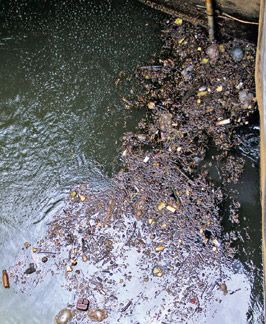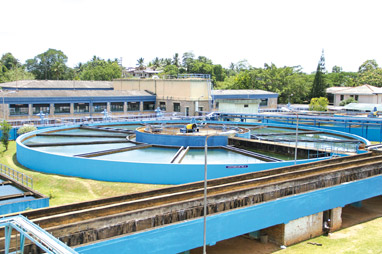Is the water really safe?
Public confused by conflicting theories about the
Kelani River contamination:
by Carol Aloysius
The Coca Cola water contamination saga continues with conflicting
theories on the exact nature of the contaminants confusing the public.
Local medical experts from the Poison Prevention Centre have, however,
enlightened the public about the adverse outcome of ingesting
water-borne contaminants.
 |
|
Contaminated water of the
Kalani River |
Tests carried out by the Central Environment Authority point to
furnace oil as being the main contaminant of the Kelani River and
Ambatale water while the National Drainage and Water Supply Board
believes it is diesel oil.
Yet another group has pointed to a chemical, which turns the water to
a caramel colour, and is banned across the US, due to its carcinogenic
risks.
Meanwhile, a study by environmental researcher Ravindra Kariyawasam,
who represents the Centre for Nature Forum is reported to have found a
high level of arsenic in the water samples obtained near the Ambatale
Pumping station. He has been quoted as saying that the arsenic
contamination of the Kelani River was due to the release of chemicals
and effluents by over 150 industries in the Biyagama Industrial zone,
adding it would take over two decades or more for even an atom of
arsenic to decompose.The irony is that while admitting the presence of
'some' type of contaminant in the drinking water, which their reports
are now revealing, the authorities continue to maintain that the water
has been treated and is hundred percent safe.
Speaking to the Sunday Observer, Chairman, National Water Supply and
Drainage Board (NWS& DB), K. A. Anzar said, "Lab tests from water
samples collected after the oil leak from the Coca Cola plant at
Kaduwela reveal that furnace oil has leaked into the water making it
unfit for human consumption. Assuring the water was now safe to drink,
he said his officers were closely watching the situation and monitoring
the water at Kelaniya and Ambatale to detect any possible abnormalities
in the water which is tested in their labs.
Safe to drink
Assuring the water was now safe to drink, he said his officers were
closely watching the situation and monitoring the water at Kelani and
Ambatale to detect any possible abnormalities in the water which is
tested in our labs.
"At present the situation is under control and the water is hundred
percent safe to drink. We are monitoring the quality with special
emphasis on oil discharges. But with so many manufacturing companies
using furnace oil and diesel mushrooming in the island, many of which
are not even registered, untreated discharges could easily be discharged
into our water bodies without our knowledge. That is why the public must
be vigilant and immediately report to us or the nearest police station
or PHI if they see any manufacturing plant, petrol station or individual
dumping untreated waste water containing harmful chemicals into
waterways," he said.
"By the time we heard about the oil leak and immediately despatched
inspectors to the site, the water had already been contaminated," he
added.He also noted that what happened recently could occur again unless
stringent penalties are taken to deal with offenders.
Memory lapse
 |
|
The Ambatale water
purification plant |
Both the CEA and NWS&DB seem to have had a convenient lapse of memory
on this count. For, if not for the protests of an irate public supported
by the media who made an outcry demanding action against the offending
company, punitive measures might still be forthcoming. Responding to the
public outcry, the CEA suspended the company's environmental licence,
which it needs in order to operate. On Monday however, the authority on
Coca Cola's request revoked the suspension, prompting a public outrage.
It was pointed out that diesel oil had resurfaced in the water supply
on August 28 when residual leaked oil was washed back into the river
after heavy rains, resulting in another water cut while the authorities
worked again to clean the Kelani. After the second clean-up, the Water
Board Chairman, K.A. Ansar gave a guarantee that the leaked diesel oil
would not cause another water cut. The Central Environmental after
deploying several officials to inspect the Kelani River from Avissawella
to the Ambatale water treatment plant, also defended the restoration of
Coca Cola's licence, with the Chairman, Prof. Lal Dharmasiri, quoted as
saying that under the present laws the company was allowed to request
the revoking of the licence suspension while guaranteeing that necessary
action had been taken to resolve the original fault.
Chairman, Centre for Environmental Journalists (CEJ) Hemantha
Withanage, however, had a different opinion. Agreeing it was legally
correct to re-issue the Environment Protection Licence (EPL) he said
such action raised suspicions because it was not done in a transparent
way.
"There is also now a controversy over the exact nature of the
contaminants, with the CEA saying it is diesel, which is pure oil and
more harmful, and the Water Board saying it is furnace oil. Another
group says it is Imidazole, a harmful chemical banned in the US because
it causes cancer.
At the end of the day it is the consumer who will have to suffer
because of these conflicting theories. The correct thing to do is to
have these samples tested in all our accredited labs and publish the
reports so that the public can decide. The public can then make an
informed choice about the water due to fear of arsenic in water they
switch to bottled water it is the manufacturers who will profit."
Twist of fate
For the 127-year, the beverage company which just two years ago won
the coveted National Quality Award 2013 for local organizations that
excel in quality management (valid for five years incidentally) the
debacle at Biyagama and ensuring controversy surrounding it is indeed an
ironic twist of fate. On that occasion, Country Manager, Kapila
Welmillage commenting on the plant's stringent treatment of waste water
is reported to have said, "The water goes through several cycles of
treatment such as meets the company's norm of effluent discharge as well
as local government norms for discharge".
By not using these facilities the day the explosion occurred, makes
the company doubly guilty - first by depriving many people of drinking
water on two occasions, and secondly aggravating health risks..
Health impact
Senior Professor of Forensic Medicine and Toxicology, Faculty of
Medicine, Colombo, Dr Ravindra Fernando said, "Poisoning can occur when
someone swallows, breathes in (inhales), or touches fuel oil. If that
happens it could affect almost every organ and even lead to the shutting
down of the body completely."
His advice is, "Get medical help right away. Do not make a person
vomit. If the chemical is on the skin or in the eyes, flush with lots of
water for at least 15 minutes. If the chemical was swallowed,
immediately give the person water or milk, unless instructed otherwise
by a health care provider. Do not give water or milk if the person is
having symptoms (such as vomiting, convulsions, or a decreased level of
alertness) that make it hard to swallow. If the person breathed in the
poison, immediately move him or her to fresh air". |

